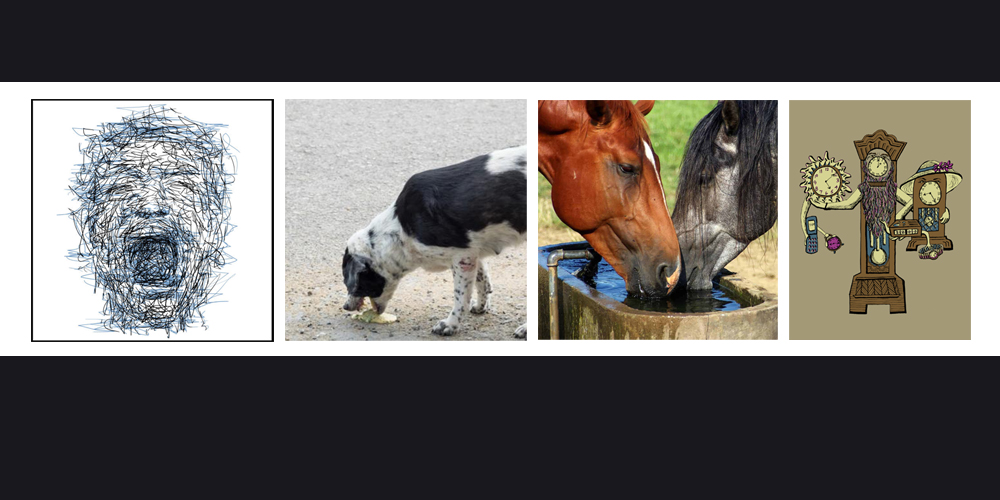I’ll bet you are puzzled how any of these things might be linked together in my mind or in a blog piece.
Well, here goes.

They say, “Insanity is doing the same thing over and over and expecting a different result.”
This saying has become popular these days and I do think there is a lot of truth to be found it the idea. However, it is only partly true.
We must ask ourselves also, “What do we do when we keep doing what seem to be the right things and the best things–even the God-things–over and over and we are not experiencing the proper results?”
In this case, I draw upon scripture.
I draw upon the promises made to us about how things work in God’s world.
The insanity–in some cases–is not a result of us doing something over and over without results and needing to alter course. But rather, the insanity has more to do the the sinfulness and brokenness of the world we live in.
Sometimes, things converge that are simply just so seemingly-impossibly “upside-down.”
“And let us not grow weary of doing good, for in due season we will reap, if we do not give up.”
– Galatians 6:9

They say, “You can lead a horse to water, but you cannot make him/her drink.”
I find this proverb more completely true than the first, for many reasons.
I ask myself, “Why would a horse NOT drink water?”
Is the horse not thirsty?
Is the horse sick?
Is the horse too weak to even drink?
Does the horse want vinegar and salt, or murky mud or crude oil to fill itself with? Is that why the horse refuses fresh water?
Is the horse blind?
Is the horse too far gone, too weak to open its mouth or stand at the trough?
Is this a rebellious horse of which bridle and bit has had no effect, that the horse refuses fresh water?
I don’t know.
As I write this, perhaps God is bringing to my mind a scripture one of the Pastors read at my first marriage. This exhortation was given to my husband of twenty years and the father of my sons:
“Drink water from your own cistern,
– Proverbs 5:15-21
running water from your own well.
16 Should your springs overflow in the streets,
your streams of water in the public squares?
17 Let them be yours alone,
never to be shared with strangers.
18 May your fountain be blessed,
and may you rejoice in the wife of your youth.
19 A loving doe, a graceful deer—
may her breasts satisfy you always,
may you ever be intoxicated with her love.
20 Why, my son, be intoxicated with another man’s wife?
Why embrace the bosom of a wayward woman?
21 For your ways are in full view of the Lord,
and he examines all your paths.”
I don’t recall how far into the quotation the Pastor read; I do know how far from the “spirit of the admonition” (as opposed to the specific “letter of the law”) that my first husband fell.
Sexual immorality is a type of curse that is passed down from the unrepentant. The only remedy for breaking such cycles is repentance.

“As a dog returns to its vomit, so fools repeat their folly.”
– Proverbs 26:11
Vomit is gross. Human beings tend to avoid throwing up–at least I do–although I have known some people to welcome the act.
A kind of “amazing mechanism designed by God for ‘cleansing’ us,” I believe was the rationale shared to me by this person!
If you are brave, there’s a lot of truth in “bringing it on” for one’s cleansing, healing and well-being.
So why on earth after vomiting something that made you sick would you eat it all up again like a dog?
This is a proverb of scripture, so God has something to teach us.
I wonder, “Why would a dog eat its own vomit?”
AI Overview
Dogs eat vomit for a variety of reasons, including:
- Instinct: Dogs are natural scavengers and may eat vomit to reclaim undigested food.
- Taste: Dogs have a strong sense of smell and may be attracted to the smell of their own vomit.
- Regurgitation: Dogs may eat regurgitated food if they throw it up after eating too fast.
- Health issues: Dogs may eat vomit if they are experiencing health issues, such as a nutritional imbalance, gastrointestinal infection, or anxiety.
- Learned behavior: Dogs may learn to eat their vomit if they are frequently left alone with it.
While it’s not always harmful for dogs to eat vomit, it’s best to discourage the behavior. Here are some tips to prevent your dog from eating their vomit:
- Clean up immediately: Remove the vomit as soon as possible.
- Teach commands: Teach your dog commands such as “leave it” or “drop it”.
- Redirect attention: If you catch your dog in the act of eating their vomit, redirect their attention to a more appropriate activity or toy.
- Supervise feedings: Supervise your dog’s meals and feed them smaller, more frequent portions.
If your dog vomits regularly, or an alarming number of times in a row, you should contact your vet.
As I read the above, I take note of the advice to “clean it up immediately” and as one who tends to be a “fixer, problem-solver and pro-active” rather than avoidant (I know, perhaps others perceive me differently) my attention turns to this point.
Many years ago in my mid-twenties I was going through a very rough time. While I could not “fix” all of what was causing the issues and my responses, there was in fact a part that I needed to fix or deal with. At one point a Pastor said to me in counseling, “You remember the old Meineke commercial? You can fix it now…or when it’s really, really broken…”
In retrospect, I delayed too much “fixing” this thing, in a variety of ways. Whether or not I was able to fix it any faster before I went lower and there was more impact, I will never know. We do the best we can at the time…yet…we can always do better, too.
God gives grace when we turn to Him fully to help us and God also enables us to even turn to Him. The invitation toward Him is constant–and when we reach to Him He is faithful to deliver us and come to our aid. I can testify to that.
I also believe there is a kind of “synergy” in that there is some mysterious combination of our free will and God’s providential workings that brings us into places of repentance. But why delay? Why keep waiting and avoiding…while the clock ticks, ticks, ticks, ticks, ticks away with compounding damage and brokenness happening by the minute?

I suppose this brings my thoughts right around to Clocks.
Tick, tick, tick…
Hickory dickory dock.
The mouse ran up the clock.
The clock struck one,
The mouse ran down,
Hickory dickory dock.
Hickory dickory dock.
The mouse ran up the clock.
The clock struck two,
The mouse ran down,
Hickory dickory dock….
Above, we see a nursery rhyme with an example of a functioning clock. There is some cute, playful thing going on where a mouse runs up and down each time, while the clock progresses as it should and as one would expect.
The above artwork I did many years ago for a tee shirt contest with a “clock theme.”
It is called, “The Clock Family.”
It was fun to do, but as I worked on it I remember thinking, “This is a representation of something ‘really messed up!'”
Each member of the family is distinctive, and on their own time.
They all seem connected somehow, and who knows which one of them really is telling the right time or if they are all “broken clocks.”
By the way, they also say that, “Even a broken clock is right twice a day.” (As though we need to add any further confusion to dysfunctional messes.)
When I look at that artwork I made around 2006 or so, the creepiest of the clock family characters seems to be the biggest, “Father Clock,” with its eyes and beard. And as I stare at it right now, I notice something even more messed up–visually obscene perhaps–as I gaze downward from the central clock figure.
Surely, there was a reason this artwork didn’t win any contest.
I still like it however, and in part there is a kind of personally prophetic quality to it.
I wonder if I might quickly re-write the old nursery rhyme? Just put random changes that will make it make no sense…
Hickory dickory dock.
The mouse ran up the clock.
The clock struck one,
The mouse banged its head,
Hickory dickory dock.
Hickory clock dock.
The clock ran up the mouse.
The clock struck two,
The mouse ran down,
Dockery hickory three.
Hickory four, five dock.
The clock ran out the tree.
The clock struck three,
The mouse threw up,
Hickory dickory dock.
Mousy mousy rock.
The mouse ran up the eight.
The two struck four,
The mouse was poor,
Hickory dickory dock.
Hickory one two three.
The clock looked fine to me.
The fine struck twelve,
The ten ran down,
Hickory dickory seven.
Seventy dickory dock.
The eleven ran up the mouse.
The mouse struck six,
The mouse ran up,
Hickory dickory what.
Whatory hickory duck.
The mouse ran up the duck.
The clock struck seven,
The mouse ran down,
Duckory dickory dock.
Hickory dickory dock.
The mouse ran up the clock.
The clock struck eight,
The mouse ran down,
Hickory dickory dock.
Hickory dickory dock.
The mouse ran up the tree.
The tree struck nine,
The mouse in time,
Hickory dickory dock.
Hickory dickory dock.
The mouse ran up the clock.
The clock struck ten,
The mouse ran to the duck who quacked quite loudly,
Hickory dickory cluck.
Hickory dickory dock.
The mouse ran up the clock.
The clock struck eleven,
The mouse ran down,
Hickory dickory dock.
Hickory dickory rock.
The mouse ran up the sock.
The clock struck one,
The mouse ran down,
And it all started over again and again.
Interestingly, as I read over my creative “re-write” I realize that this could be read aloud and it still make “half sense.” There is enough stability in the stanzas/meter/repetitive parts to keep one’s attention–especially when we are familiar with how things are supposed to sound in this rhyme.
Isn’t that the way within the continuum of dysfunctionalities?
We hobble along in functionality or possibly the appearance of rhyme and reason, yet something is naggingly off…


Thank You For Reading
Please Feel Free To Express Your Thoughts Below




